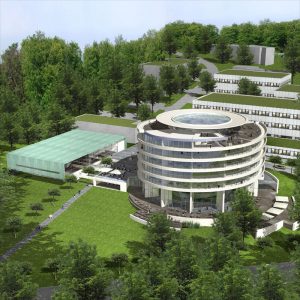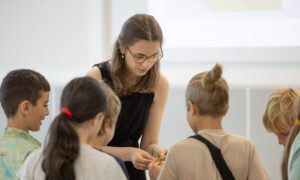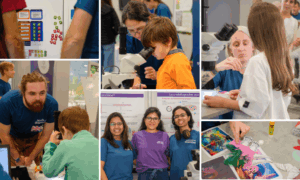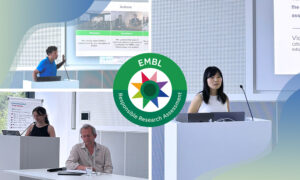Giving European science a headstart through training
The German Minister for Education and Research breaks ground for EMBL's new Advanced Training Centre – Funding comes from the German Ministry for Education and Research, the Klaus Tschira Foundation, the federal state of Baden-Württemberg and EMBL's
Today, the German Minister for Education and Research, Annette Schavan, breaks ground for the new training and conference centre for the life sciences that will be built on the EMBL campus in Heidelberg. The German Ministry for Education and Research (BMBF), the Klaus Tschira Foundation and the federal state of Baden-Württemberg contribute to the 30 million Euro project. The Advanced Training Centre (ATC) will be a unique European centre that combines cutting-edge facilities for education of young scientists with the infrastructure required to host international conferences.
“European research in the life sciences is no longer confined by geographical or disciplinary borders,” says Iain Mattaj, Director General of EMBL. “Europe calls for a central platform where scientists from different countries, disciplines and generations can meet to exchange ideas and their best practices. Filling this gap, the new ATC will not only strengthen EMBL’s excellence and its leading role in Europe, but will also promote Europe as a hotspot for research and education.”
Thanks to the financial support by the BMBF that contributes 13.1 million Euro to the project, the generous donation of ten million Euro by the Klaus Tschira Foundation, the one million Euro provided by the federal state of Baden-Württemberg and the contribution of EMBL’s member states, the ATC will open its doors in spring 2009.
“The BMBF supports the construction of the ATC as a groundbreaking project in the areas of scientific exchange, education and training in the life sciences. Such a modern and high-quality centre will allow us to host many of the most prestigious conferences in Germany,” says the German Minister for Education and Research, Annette Schavan.
The new ATC will have an area of 16,000 m2 and it will feature an auditorium for an audience of 450 people and a large display area for the presentation of scientific posters. Inspired by the DNA, the carrier of genetic information, the building will have the structure of a double helix. In the planned teaching labs and seminar rooms EMBL’s International Centre for Advanced Training (EICAT) will organise courses and practical workshops for scientists at various levels of their careers. The building also contains room for the training of teachers and other outreach activities.
“Scientists never really complete their education; there are always new things to learn. This is why our foundation is especially concerned with training projects and the promotion of young talents,” says Klaus Tschira, whose foundation supports the natural sciences, computer science and mathematics. “The transparent architecture of the ATC, designed like a DNA molecule in the shape of a double helix, does not only offer ideal functional conditions, but also creates an inspiring atmosphere.” Klaus Tschira himself developed the design of the building and refined it together with the architects Bernhardt + Partner in Darmstadt.
The extensive expertise of EMBL and its sister organisation EMBO (European Molecular Biology Organization) in organising regular conferences and interdisciplinary workshops forms an ideal basis for the successful management of the ATC. The new centre will also benefit from the excellent scientific infrastructure and existing academic, institutional and industrial networks of the Rhein-Neckar region.




